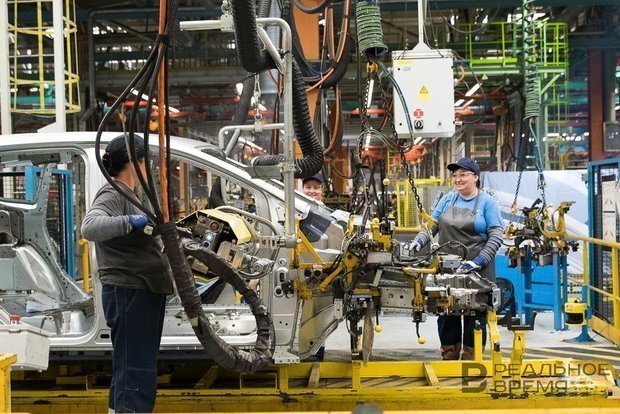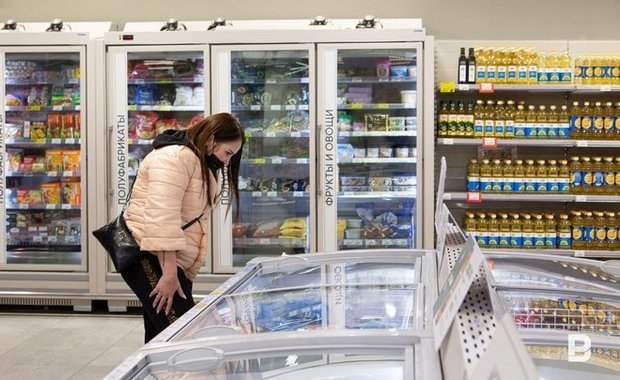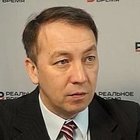Realnoe Vremya’s analytics: consumer market out of the peak
Retail chains, catering and service sector will recover after the consequences of the disastrous 2022

Retail trade turnover in Tatarstan will grow to 1,28 trillion rubles in 2023, catering — up to 57,19 billion rubles, and paid services to the population — up to 349,73 billion rubles. It cannot be worse than 2022, and there is nowhere to fall lower, experts of Realnoe Vremya believe. Retail chains have restored logistics chains, and the foundation for consumer demand has been created.
The Ministry of Economy of Tatarstan forecasts a growth of the consumer market in the republic. Retail trade turnover will grow by 2,4% in comparable prices to the previous year — up to 1,28 trillion rubles. The turnover of public catering will increase by 2% to 57,19 billion rubles, and paid services to the population by 3% to 349,73 billion rubles.
At the same time, unemployment due to the withdrawal of foreign companies from the market, according to the forecasts of the Ministry of Economy, will increase by 6,6%, to 16 thousand people, but will not reach the peak indicators of the coronavirus 2020 year. For comparison, at the end of August this year, the number of official unemployed amounted to 10,3 thousand people, and in August 2020 — 79,1 thousand people.
Solvent demand will also begin to recover in 2023. If real wages in Tatarstan in 2022, according to the department's estimates, will fall by 5,3% compared to the previous year, then in 2023 real incomes of the population will grow by 2% compared to the previous year.

“It won't be worse than in 2022"
The difficulties faced by the consumer market in 2022 are unprecedented: these are the destruction of logistics chains, the need to quickly find new suppliers, inflation, and a decrease in purchasing power. According to the forecasts of Infoline agency, the turnover of the Russian retail market will decrease by 7-8% in 2022. The Association of Retail Companies (ACORT), which unites the largest retailers — X5 Retail Group, Magnit, Lenta, OK, Detsky Mir, M.Video, Eldorado and others, believes that the drop will be 8-9%.
Retail trade turnover in Tatarstan fell by 2,5% to 790,5 billion rubles for 8 months of 2022. The turnover of bars, cafes and restaurants amounted to 33 billion rubles and even showed a slight increase (0,2%), but mainly due to price increases, for 8 months of 2022. However, with the beginning of mobilisation, the revenue of Russian catering, according to the estimates of restaurateurs, decreased by 10-30%.
According to the telegram channel “Svobodnaya Kassa”, the mobilisation has seriously hit not only catering. The bookstores' turnover fell the most in a week from September 21 to 27 (-23%). The number of checks there has decreased by 17%, and the average check — by 7%. At stationery stores, a drop in turnover is 17%, the number of checks — 15%, average check — 2%. In the jewelry segment, turnover has decreased by 12%, in furniture segment — by 11%. The average check increased only among sports retailers (+11%).
Retail chains have built new logistics chains
ACORT confirmed to Realnoe Vremya that they expect the retail market to grow in 2023 and are guided by the assessment of the Ministry of Economic Development of the Russian Federation, which forecasts a return of retail trade turnover in 2023 to growth — by 2,7%.

Basis for increasing the market's resilience to the sanctions crisis, according to the Association, have already been laid this year: retail chains have managed to build new logistics chains, active work is underway to expand the assortment at the expense of new markets of the EAEU countries, Asia, the Middle East and Latin America. The dynamics of the market in 2023 will be influenced by inflation, consumer activity and general event background, but the foundation for ensuring consumer demand has already been created.
However, not all experts share this “cautious optimism”. In conditions of falling real incomes and inflation, the population will postpone expensive purchases, buy less non-food products, including clothes and gadgets, and will probably switch to a lower price segment. The service sector — restaurants, beauty salons and fitness centres — will suffer the most.
“People will prefer maximum savings on secondary things”
-
-

Mikhail Klopoukh restaurateur, founder of Po Chesnoku federal chain of restaurants and Mellow gastrobar
-
It is difficult now to give a forecast for the fourth quarter. In general, the year 2022 was a successful year for catering: revenue was higher than in 2021, but largely due to forced price increases. Real turnover was less by about 10%.
Since the announcement of partial mobilisation, revenue in Russian restaurants has decreased from 10% to 30%.
Making forecasts for 2023 is difficult now. Everything will depend on the further development of events. Personally, I think that now the degree of heat will continue to rise, and by winter it will subside, the parties will agree on something. In this case, there will be a quick reversal in the positive direction.
-
-
-

Adel Yagudin entrepreneur, founder of Indever men's clothing company and the owner of stores under Sisley brand in Kazan
-
Globally, the consumer market is now falling, but we are doing well, because due to the departure of many foreign brands from Russia, competition has become less.
In general, now we are witnessing depression, inflation and falling sales in most industries, so I forecast that, for example, the catering market will definitely not recover next year: people will save on trips to cafes and restaurants.
-
-
-

Almir Mikheev Deputy of the State Council of the Republic of Tatarstan, leader of the Tatarstan branch of A Just Russia Party
-
According to some reports, a decline in retail trade turnover this year will be about 9%. At the same time, a growth in 2023 is projected in relation to 2022 by a modest but still questionable 2-3%.
I do not share this cautious optimism: even according to the forecasts of the Ministry of Finance, the fall in real incomes of Russians was about 7%, inflation, according to various estimates, is from 10% to 15%. In such conditions, expectations in retail are not the best. I believe that people will postpone expensive purchases, will buy less non-food products, including clothes, gadgets.
Certainly, the demand for food will not go anywhere — but it will probably move to a lower price segment. In such conditions, restaurants, beauty salons, gyms and the like will suffer the most in the consumer economy. Their services will be refused because they are not included in the category of essentials, and people will prefer maximum savings on minor things.
-
-
-

Mikhail Sharipov Chairman of the Board of the Association of Restaurateurs and Hoteliers of Tatarstan, founder of MemSol restaurant holding (it includes Skazka, Cuba Libre restaurants in Kazan, JonJoli in Innopolis)
-
The optimism of the Ministry of Economy was based on the dynamics of the growth of business activity indicators in the period from June to August inclusive. The economy recovered, business activity increased by 15-20% by 2021. Given the dynamics, the optimistic forecast was made correctly, perhaps there were others that they decided not to cover.
However, after September 20, catering, like many areas of business, is experiencing a decline. We note, by industry, a drop from 10% (fast food sector) to 30% (premium restaurants sector), which is critical for our industry.
Based on the current realities, two main scenarios are clearly visible. According to the first, stagnation will continue if the economy solves military tasks and the indicators are at this level or even lower for more than six months. Then most catering facilities will need to diversify and optimise their staff.
According to the second scenario, stagnation will end if it is possible to replace social tension with confidence and stability. Then the market will recover and development will continue, including personnel. We must not forget that the eating out industry has a small amount of monetary participation in the life of the state, but our sphere has a huge social impact — each restaurant educates a huge number of young people, motivates them to work, develops business skills, teamwork and diligence.
Our Association is currently working in a number of areas to create a comfortable and developing ecosystem for market players.
Firstly, we provide support to those who turn to us for solutions to effectively reduce costs, increase the quality of work and maintain a team of professionals. Secondly, we continue to implement social projects. Applications for participation in the tournament of young chefs named after Y. Akhmetzyanova are now in full swing, and this contributes to the development of youth and concentration on self-development. Thirdly, we are actively cooperating with the authorities to improve the level of gastronomic attractiveness of Tatarstan.
-
-
-

Albert Bikbov blogger and economist
-
The positive forecast for 2023, despite its paradoxical nature, is based on the rather logical premise “it will not be worse than in 2022". The mass withdrawal of foreign companies from the country, which often dominated certain segments of the consumer market, a jump in inflation in the spring of 2022, an almost half-drop in imports — this is already a played-out story, and it will not happen again in 2023.
Separately, I would like to say about the disaster in the car market, it is really nowhere to fall lower there. Yes, the year 2022 collected several one-time shocks for the consumer market, and that will be the end of it.
It turns out that 2022 will have a “low base effect” for 2023, when even a slight increase in retail turnover in 2023 will certainly be positively evaluated in comparison with the failed 2022.
The deflationary processes that unfolded in the summer of 2022 will continue in 2023 and will lead to an increase in real monetary incomes of the population, which are considered as nominal incomes minus inflation. And the growth of real incomes, as a rule, pushes up consumer spending.
Besides, we should not forget about the unfolding process of import substitution, including by replacing foreign players in the consumer market who have left the country. Even automotive industry and auto retail have begun to revive in recent months due to the supply of cars and their components from friendly countries.
The most important factor affecting the consumer market is consumer sentiment, which is currently at a low level due to the uncertainty associated with the special military operation in Ukraine. Because of this uncertainty, the population now has a predominantly savings model of behaviour. For example, according to the results of a survey by the SuperJob service, in October, every second Russian admitted that they began to save more, and the share of those who increased expenses fell by more than a third compared to March.
The most affected retail sector today is non-food durable goods, which is most affected by uncertainty about the future. The removal of uncertainty will be a powerful driver of improving consumer sentiment and will lead to an increase in consumer spending. There is a very high probability that the tasks of the special military operation in Ukraine will be completed even in the first half of 2023. Or there will be a successful negotiation process to freeze the conflict. Yes, this is an optimistic forecast, but “hope is my compass”.
Accordingly, uncertainty about the future will be removed and consumers will naturally react to this by switching from a savings model to a consumer one. So I look at 2023 with restrained optimism.
-